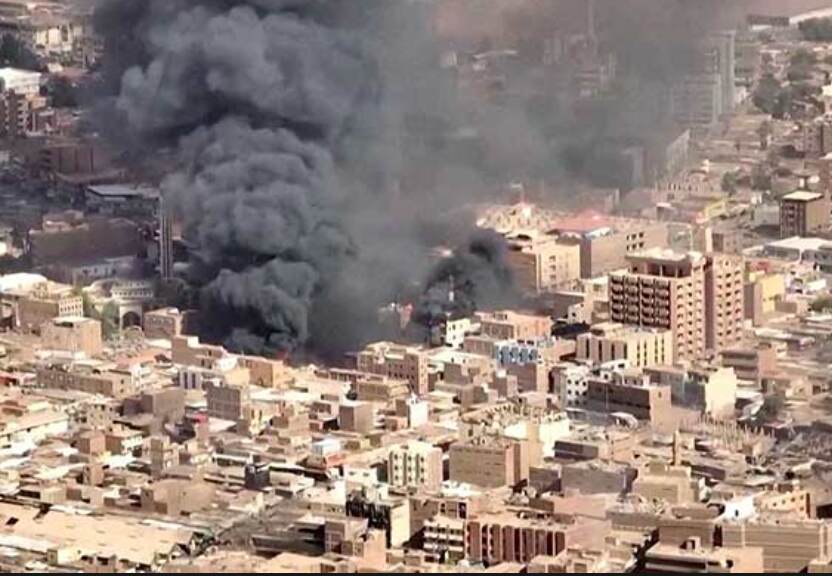Civilian Plane Crash Adds to Growing Tragedy in War-Torn Sudan
Tragic crash in Sudan claims nine lives, including four military personnel, as ongoing conflict takes its toll on the country. Urgent humanitarian support and mediation efforts are needed to bring peace.
A tragic incident occurred in the eastern coastal city of Port Sudan, Sudan, as a civilian plane crashed shortly after taking off from the city's airport. The military reported that nine people, including four military personnel, lost their lives in the crash.
🇸🇩 Plane crash kills nine in Sudan | @JehronMuhammad
— AUC3I (@AUC31) July 24, 2023
Nine people, including four soldiers, were killed on Sunday evening when a civilian plane crashed in Sudan due to “technical” reasons, the army said, as the war in the east African country entered its 100th day.
In Port…
The military also revealed that a child miraculously survived the accident. Port Sudan, which has so far been unaffected by the ongoing war between the military and the powerful paramilitary Rapid Support Forces (RSF), experienced the devastation firsthand.
The military attributed the crash to a technical failure but provided no further details regarding the incident. Among the victims was Al-Taher Abdel-Rahman, the secretary of Finance Minister Gebreil Ibrahim, whose passing was mourned by the minister on social media.
An Antonov plane crashed at Port Sudan airport, killing 9 ppl.
— lahadda 🇷🇺 (@lahadda88) July 24, 2023
Four soldiers were among those who lost their lives in the accident.
the cause of the plane crash was a technical failure. due to ongoing war in Sudan, the only airport serving the country is Port Sudan. pic.twitter.com/luPiyRAThz
This incident adds to the already devastating toll that the conflict in Sudan has taken on lives and infrastructure. Sudan has been embroiled in chaos since mid-April, when tensions between the military and the RSF erupted into open fighting across the country, including the capital city of Khartoum.
This ongoing war has turned urban areas, including Khartoum, into battlefields, while the region of Darfur has experienced some of the worst violence, with conflicts escalating into ethnic clashes. The conflict's casualties continue to rise, with Health Minister Haitham Mohammed Ibrahim reporting that more than 3,000 people have been killed and over 6,000 injured.
However, the true number of casualties is suspected to be even higher. The dire situation has forced more than 2.6 million people to flee their homes within Sudan, seeking safer areas, and over 757,000 individuals have crossed into neighboring countries, according to the U.N. migration agency.
The consequences of the war extend beyond the direct conflict, as the U.N. refugee agency has warned about the dire conditions faced by South Sudanese refugee children in Sudan's southern province of White Nile. Since the conflict's onset, approximately 300 children have died due to suspected measles and malnutrition. Innocent civilians are being uprooted daily, upending their lives and livelihoods.
Furthermore, Sudan has seen its hopes for a democratic transition dashed by the conflict. Following the popular uprising in April 2019 that led to the removal of longtime dictator Omar al-Bashir, the country had started its fragile journey toward democracy. However, the military and the RSF disrupted this transition with a coup in October 2021.
Despite international efforts, a cease-fire has yet to be established to provide crucial humanitarian support to the millions of people affected by the war. William Carter, the Norwegian Refugee Council's director in Sudan, warned of a potential total collapse in the country if efforts to bring peace and aid are not sustained.
Humanitarian organizations like Care International have called for a cease-fire and the creation of a safe corridor to deliver essential goods and services to those trapped in the conflict. Funding is also urgently required to address the growing needs of the Sudanese people.
The situation in Sudan cannot be ignored or underestimated, as its destabilizing potential extends beyond its borders and could impact the entire region, according to David MacDonald, CARE's country director in Sudan.
Efforts to mediate and find a resolution continue, with talks between the military and the RSF held in the Saudi Arabian city of Jeddah, facilitated by Saudi Arabia and the United States. Simultaneously, pro-democracy leaders are convening in Cairo, Egypt, to discuss ways to end the war and reestablish the derailed transition to democracy.
The Forces of Freedom and Change, the pro-democracy coalition, have reaffirmed their call for an end to the fighting. As the conflict in Sudan reaches the 100-day mark with no signs of abating, it is crucial that sustained diplomatic efforts are applied to alleviate the suffering of civilians.
The international community must not turn a blind eye to the deteriorating situation in Sudan, as the consequences could prove catastrophic for the entire region.




